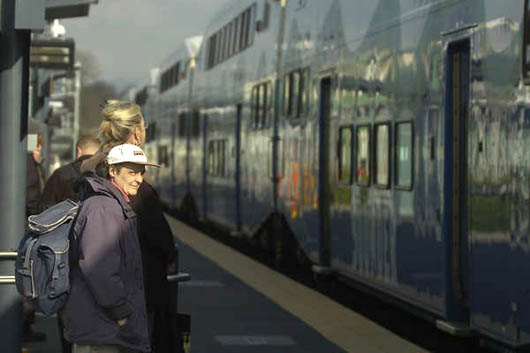
25 March 2008

For nearly eight years Sounder trains have carried hundreds of Pierce County commuters north to Seattle each weekday morning. But last fall the commuter rail service took on a new mission: transporting commuters south to Tacoma.
Though it's off to a modest start, a few dozen people ride south each weekday morning, the new "reverse commute" train is another milestone for Sound Transit. And it's not the last one.
Another Tacoma-to-Seattle train will debut in September. So will a sixth northbound morning train. And Sound Transit hopes to extend service to Lakewood by 2011.
As service expands, so does the number of Sounder passengers. The number of people boarding Sounder trains each weekday has nearly tripled in four years.
"Each time you add a new service option, a new time choice, it makes it more convenient for new people to join the whole transit movement," said Sound Transit spokeswoman Linda Robson.
Voters in Pierce, King, and Snohomish counties approved local taxes to build and operate the regional transit system in 1996. In addition to the Sounder, which serves commuters from Everett to Tacoma, the agency offers regional bus service and the downtown Tacoma Link. And it's developing a light-rail line from downtown Seattle to Sea-Tac Airport.
The transit system as originally envisioned is either completed, under construction, or in development. But it's been a long time coming.
When voters approved tax hikes for the transit system, they were told it would be finished in 10 years.
That didn't happen. Instead, projects were delayed and costs ballooned.
In 2005 a citizen oversight panel cited numerous reasons. The panel said Sound Transit relied on overly optimistic passenger projections and project development timelines. Voter initiatives to reduce local and state tax revenue also played a role. So did protracted negotiations with BNSF Railway over track improvements.
The panel said the 10 year completion promise "clearly was unrealistic and should not have been made."
"They over promised, is what they did," said David Chapin, chairman of the oversight panel.
But in recent years the panel has praised Sound Transit. In a report issued last month, the panel said the agency made good progress on the regional transit system in 2007.
"We think the agency has greatly matured into a very effective, well-run organization," Chapin said. "We think, on the whole, they're doing a good job."
Last year's progress included the September introduction of the reverse-commute train from Seattle to Tacoma.
The southbound train leaves Seattle at 06:10 each weekday and arrives in Tacoma an hour later after stops in Tukwila, Kent, Auburn, Sumner, and Puyallup. An afternoon train leaves Tacoma at 16:45 bound for Seattle.
Robson said the reverse commute allows the agency to offer a fifth northbound train in the morning despite having room to house only four trains at a time in Tacoma. The fifth train starts in Seattle and picks up passengers on its way to Tacoma before heading north again.
Robson said the train gives commuters another option besides driving or taking the bus. And she said Tacoma's growing economy was a factor in the decision to begin the service.
The number of passengers heading south is relatively small.
In January an average of 38 people boarded the southbound train each morning. By comparison, the new northbound train departing Tacoma at 05:00 saw an average of 509 passengers in January.
Robson said the number of reverse-commute passengers is about what the agency expected. But she thinks it will grow as the agency expands service.
Sound Transit will launch another reverse-commute train, along with a sixth northbound morning train, in September. Next year it plans to add a seventh northbound morning commute trip.
As Sounder service expands, so does the number of passengers it serves. In 2007, an average of 8,026 people boarded Sounder trains each weekday, up from 2,740 in 2003. In January of this year, an average of 9,312 people boarded the trains. In February, the average was 9,123 passengers.
The Sounder cost US$24.8 million to operate last year.
Robson said each expansion of service reaches a new group of commuters willing to take the train instead of driving the region's crowded highways.
"Commuting by themselves in their cars is becoming more and more difficult as each year passes," she said.
Sounder Day Trippers
The number of people boarding Sounder commuter trains has nearly tripled in recent years.
Year Average Weekday Boardings
2003 - 2,740
2004 - 3,512
2005 - 4,565
2006 - 6,310
2007 - 8,026
